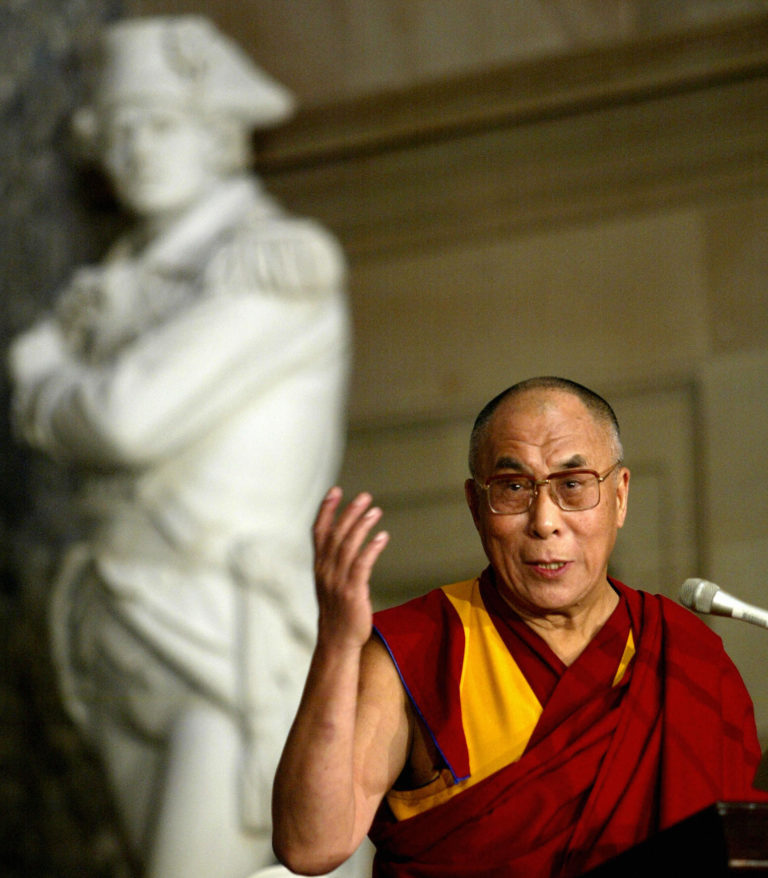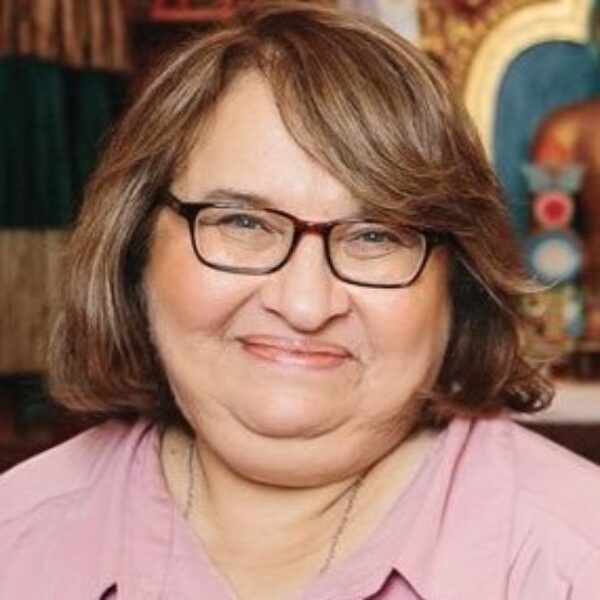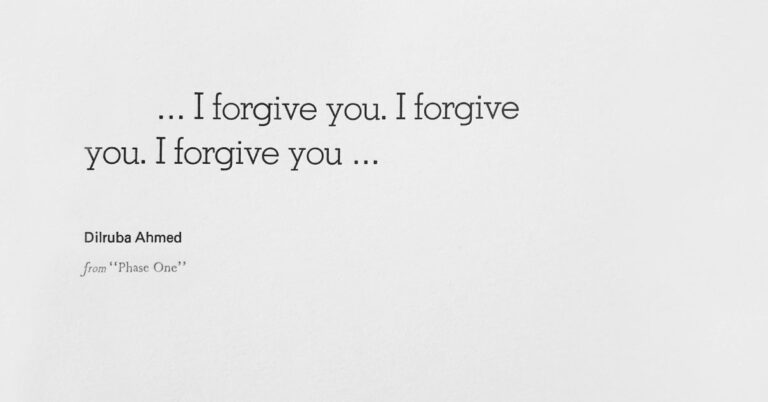
The Dalai Lama makes remarks during an event celebrating the 20th anniversary of the U.S. Congressional Human Rights Caucus on September 9, 2003 at the U.S. Congress in Washington, DC. Image by Tim Sloan/Agence France-Presse / Getty Images..
The Dalai Lama: A Model of Someone Who Has Lost A Lot
It’s the Dalai Lama’s birthday!
The Dalai Lama turns 80 today. I’m not totally sure how he’ll celebrate it, other than the fact that he’ll be in the U.S. and plans a panel discussion on compassion. That seems a good Dalai Lama-like celebration.
I first met him in 1970, when I was 18 and he was 35. I had gone to India to learn meditation and began in Dharamsala, where he lived. He seemed cordial, interested in everything and everyone, and of course, young, even to my youthful eyes. I guess I was expecting an ancient-seeming guru to match the ancient wisdom I was searching for to help me feel less fragmented. I didn’t have the vocabulary to call it fragmentation back then, but that’s a good descriptive word for my inner state at the time I arrived in India. Splintered would be another one, as I lived within a cascade of disparate, unhappy emotions without much coherence, stability, or integration.
I also didn’t think to use the contrasting word “wholeness” to describe what I was looking for, but it was exactly that yearning that set me off on my search — and what I sensed in the Dalai Lama. Without knowing all that much about him, I got a sense that he was who he was, and he knew who he was and what he cared about — whether he was serving in a formal role or taking a walk, addressing lots of people or just a handful. He never seemed to assume a mask or a false persona to fulfill someone else’s expectations or the demands of the role. Even in an elaborate ritual, he seemed to be himself.
And how much more so now. It’s been fascinating to watch the development of the Dalai Lama’s stature in the world, to see his interfaith dialogues and his conversations with scientists. We’ve had a chance to bear witness to the Dalai Lama’s years of exile, his statesmanship, his ultimate renunciation of a political role, and his movement from being seen as the leader of a particular Tibetan Buddhist sect to becoming a worldwide moral exemplar, apart from a particular religious belief or affiliation. As he is so famously quoted:
“My religion is very simple. My religion is kindness.”
In 1999, before the turn of the millennium, the Dalai Lama began talking about the ethical implications of radical income inequality. I’d never heard someone in a spiritual context speak about anything like that. Usually in Buddhist teaching, if you are discussing ethical action in regards to stealing, it is first described in very direct and immediate terms, something like, “If you see a person up ahead drop a bill, call out to them. Don’t steal.”
Deeper explorations bring forth issues of contentment, what’s enough, how much does one need to consume. But I’d never heard someone actually say, “Why isn’t it enough to be a millionaire? Why do you need to be a billionaire? How many billions?”
After September 11, 2001 he offered condolences — and a strong recommendation the U.S. not turn to violence to retaliate. A couple of years later, at a massive gathering in Central Park, the Dalai Lama spoke of the sorrow engendered by the attacks of September 11th and gracefully wove that into a tapestry of the sorrows encountered in life, the kinds that one could work to prevent, like mothers and children starving in Africa and the condition of many in U.S. prisons (something he had just been learning about).
The Dalai Lama has spoken about the importance of action and not just prayer to try to make the world a better place. I find that statement quite interesting, especially coming from a monk. It implies a universal responsibility, a need not just to envision a world less filled with suffering, but to help create one.
He reportedly wakes up very early each morning to do hours of meditation practice. He teaches. He meets with people. And he travels.
Through it all, even given the dignity of the office, the security, the protocol, he still seems to me to be fully himself, wherever he is. It’s fascinating to see him with bishops, rabbis, political leaders, and — on the occasion I’ve coincidentally seen him leave the hotel he is staying in — housekeepers, cooks, gardeners, and busboys. As far as I can tell, he’s pretty much the same.
I have long held him as a model of someone who has lost a lot, been through a lot, and holds compassion as his steady, navigating principle. A lot of us have lost a lot, been through a lot, and just given up, or feel too undone to try to help others. I feel I am a much better person because of his example.
I hope the Dalai Lama has a terrific birthday here in the U.S., and many, many more with good health and ease of heart to come.

